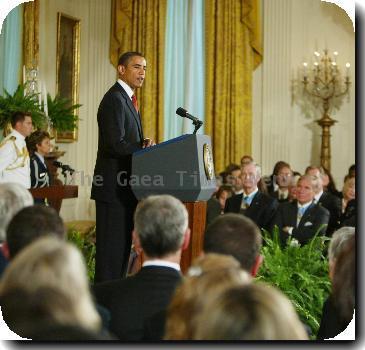World powers urge Iran to reconsider nuclear deal
By DPA, IANSFriday, November 20, 2009
BERLIN/BRUSSELS - Top diplomats from the so-called “5+1″ group of world powers expressed disappointment Friday at Iran’s rejection of a compromise deal on the country’s controversial nuclear programme and urged its leaders to reconsider.
“We urge Iran to reconsider the opportunity offered by this agreement to meet the humanitarian needs of its people and to engage seriously with us in dialogue and negotiations,” said the officials from the five permanent members of the UN Security Council - Britain, China, France, Russia and the US - plus Germany after talks in Brussels.
The International Atomic Energy Agency (IAEA) in Vienna has proposed a deal whereby Iran would ship its low-grade enriched uranium to Russia and France, where it would be processed into fuel for Tehran’s medical research reactor.
But Iranian President Mahmoud Ahmadinejad has already brushed off threats of international sanctions after apparently rejecting the compromise.
IAEA chief Mohamed ElBaradei said Friday in Berlin he believed Iran had not totally turned down his agency’s offer.
“The ball is now in Iran’s court. I hope they will not miss this fleeting chance,” he told reporters in Berlin.
But 5+1 officials appeared less hopeful.
“Iran has not responded positively to the IAEA proposed agreement for the provision of nuclear fuel for its Tehran Research Reactor,” the statement in Brussels said.
Iran has yet to make a formal written response to the IAEA’s proposal, with Iranian Foreign Minister Manouchehr Mottaki saying Wednesday that Iran would only accept the fuel deal if the swap of low-enriched uranium for nuclear fuel were to be effected simultaneously.
ElBaradei has accordingly proposed Turkey as a trusted intermediary, whereby Iran would ship the nuclear fuel to Turkey, which would hold on to it while Russia enriches a separate batch of nuclear fuel. Russia would only receive the original Iranian fuel once it had delivered the enriched fuel to Iran.
European Union (EU) diplomats said it was difficult to understand why Iran would not accept such a compromise and complained about “too many conflicting statements” coming out of Tehran.
Speaking in Seoul Thursday, US President Barack Obama said the US and its international allies would discuss “consequences”, most likely in the form of tougher sanctions against Iran.
But the 5+1 diplomats only discussed the possibility of sanctions “in general terms” while in Brussels and agreed to continue with their “dual track” approach of offering negotiations while threatening possible measures against Tehran, officials said.
Speaking in Berlin, ElBaradei said Iran “needed to rise above their domestic conflicts” on the nuclear issue and take a “minimum risk” in the interests of peace.

